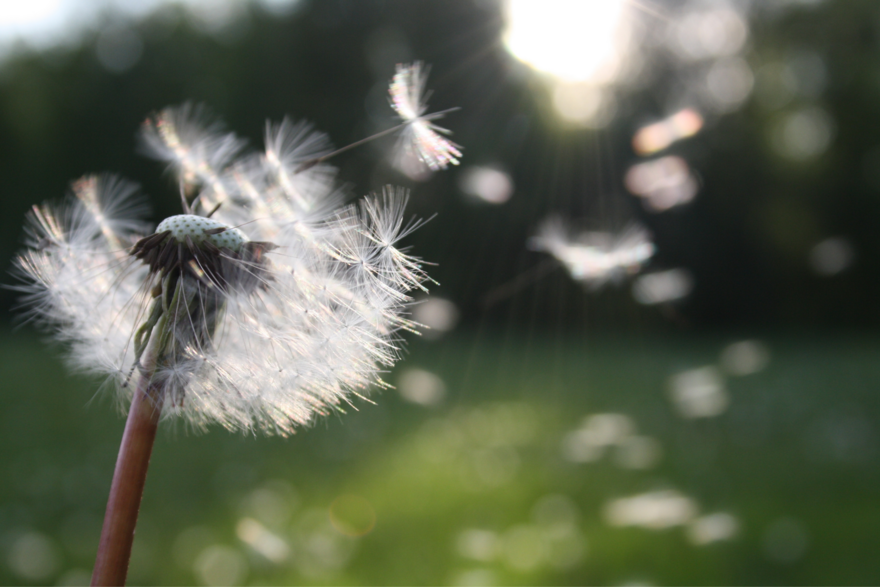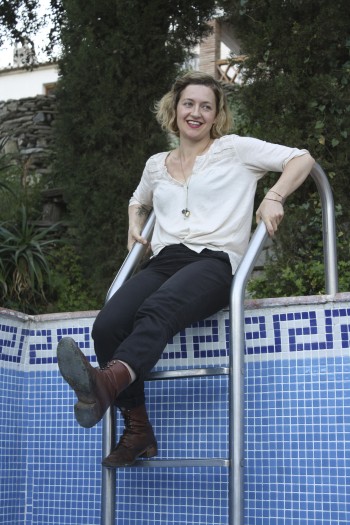Never Do Homework Again!

When I was in Barcelona, I visited La Sagrada Família, the (still unfinished) basilica designed by modernist architect Antoni Gaudí. I'd often heard that Gaudí was "inspired by nature" but until I stepped inside the cathedral, I did not understand what that really meant.
Light comes in through the windows above the way sunlight filters through a forest canopy. But his design is literally based on the geometry of nature: he invented a new kind of architectural column that is based on the way tree trunks grow. 
Gaudí said that he doubted his designs at the start. He knew that the forms of nature clearly made sense, design-wise, but the thing that gave him pause was that nobody else was using them in architecture already. He second guessed himself – and he did it anyway. Here's to doing it anyway.
In Italy, I told my Lemon Tree writers something like this every day, one way or another. We all need to hear it. Write what you want to read. Write to get away with something. Write for the joy of feeling something that you know is true. Write something inappropriate. Write something unoriginal. Write something nobody has written before. Write because it feels good to make something. Write like a rebel, write like a teenager.
What do you think you're allowed to write?
What do you think you aren't allowed to write?
Erin Robinsong is in the spotlight today. In her piece, she shares what happened to her when she stopped writing joylessly – aka, writing what she thought she should be writing. If you've ever felt that you've been showing up for your writing the way you've shown up for a homework assignment, please read her spotlight today.
When I stepped inside Gaudí's cathedral, I lost my breath. I'd never seen anything like it. Sun came through the stained-glass windows. Coloured light dripped down the tree trunks and pooled at my feet. Two school girls stood in the red light, giggling and spinning like they'd taken drugs. It felt more forest than church. How in the world did Gaudí get away with this? Who did he think he was?
Incredible things can happen when you create with a healthy dollop of I don't care what has been done up to now.
Erin's piece today is shocking in its freshness. I'm excited to share it with you. Please share your thoughts in the comments! Do you ever feel like your writing is homework, and that you're a diligent student? Have you ever dropped your diligence and written something that might not be allowed? What happened?
(PS - Erin Robinsong is a TA in The Story Intensive! She will be teaching one of the classes this fall.)
Meet Erin
 Erin Robinsong is a poet, editor and interdisciplinary artist. She lives and teaches in Toronto, and online as a TA for The Story Intensive. This spring, her work is in The Capilano Review, Tag: Canadian Poets at Play, Canadian Ecstasy, The Goose, and onstage at Artscape Youngplace.
Erin Robinsong is a poet, editor and interdisciplinary artist. She lives and teaches in Toronto, and online as a TA for The Story Intensive. This spring, her work is in The Capilano Review, Tag: Canadian Poets at Play, Canadian Ecstasy, The Goose, and onstage at Artscape Youngplace.
Handwriting or computer?
Handwriting for roving, computer for commitment – mentally and otherwise.
Page count or time count?
Quality of attention. I find time and/or page count are not accurate measures at all – I can squander whole days, or be prolific with a few hours a week, or a few minutes a day.
First drafts or revision?
I used to revise my writing to death, until I began to pay more attention to the raw energy of first drafts, and to become aesthetically interested in that. Now I try to keep that energy in the syntax. But I also leave 99% of what I write behind. It’s like improvising to find choreography.
Writing solo, writing partner, or writing group?
Physically, I write alone mostly, but writing with others can be so energizing – it can bring out new things, a certain jockishness, I feel more brash. But when I am ready to show something that I’ve been working on, then I go to my reading partners.
Earplugs/quiet or headphones/music?
Depends on the day/stage of what I’m writing, but I don’t usually listen to music, I find it enters the writing too much. But sometimes I intentionally enter the music with writing, as a way out of my own head.
Never Do Homework Again
For many years, I enjoyed the faux-freedom of writing that looked and sounded like someone else. Who was she? Bulletproof, it was hard to tell. Was she a woman? Where had she come from? Writing like this had some stalwart moments, but was generally no fun at all. Pleasure and joy were for other kinds of artists.
This is a myth that is perpetuated in many circles of writers, and I’m amazed I spent so many years writing poems as if they were homework assignments. After all, there are plenty of other joyless jobs that one could pursue. One might argue (and frequently does) that writing may not be fun, but it is X (meaningful, necessary, etc.). This might be true for some, but my relationship to writing has become more and more joyful as I have slowly released myself from internalized ideas about writing I didn’t know I had. Namely that 1) Make good art. 2) Some art is taken more seriously than other art 3) Writing that includes the self, especially the womanself, is embarrassing and diaristic. 4) Ditto for the spirit. 5) Writing that is overtly political lands somewhere between naïve and strident. 6) Experiments with the shape of the poem will not be taken seriously. Etc.
The problem with internalized ideas is that it’s hard to recognize them as ideas, and given the kinds of ideas these are, likely ideas had by and for a particular kind of male writer, to whom I can’t be an equal even if I erase myself and my ideas, as I tried very hard to do. Had I known this, I might have been less pious.
Recently I met an old friend, a writer I first met in a creative writing program many years ago. We sat in a coffee shop in New York, reading and editing each other’s recent work. The transgressive magic, the badness of what we read made thunderbolts of joy that flew around the hipster coffee shop, threatening to destroy it for the better. It seems we had both, over the course of a 15 year friendship, living in different cities, pursuing graduate degrees in Creative Writing at different universities, tried to write in a way that did not make us truly freak out with happiness. After healing from a combined total of five degrees, we were now (as my friend pointed out) teenagers twice over, and newly in love with poetry like we were 15 and had just realized we would rule the world doing it. We could buy our friends houses and pull revolution out of our asses, and never do homework again.
An idea about freedom we cherish in this culture is that as artists we can do and say anything. This is our job, to be unlimited. Any limitations are purely personal. There are plenty of neoliberal myths about the powers of the individual, but I have become particularly interested in how I might actually say what I want to. It’s as much a matter of the spirit as it is of good times as it is of revolution. In her essay “The Poetics of Disobedience” Alice Notley writes, “It seemed one had to disobey the past and the practices of literary males in order to talk about what was going on most literarily around one, the pregnant body, and babies for example. There were no babies in poetry then. How could that have been? What are we leaving out now?” You don’t know until someone writes it, and thus creates an opening, and sometimes you are the person who can say it.
Tell us about the excerpt you're sharing today.
Is this notes for a story, is it a poem? The character seems so familiar to me, do I know her? I have questions about this piece, but they are questions I don’t feel pressed to answer in the usual ways. I’ve never quite written anything like this before, although now that I think about it, it reminds me of what I was writing when I was about 20, as if a tunnel ran between them.
This piece came out of the 100 sentence exercise in the SSM lesson on Consciousness, but then instead of adding sentences to it to flesh it out, I stripped them away and now there are only 36; my age plus one, like a mystery guest. I want to experiment with a style of narrative that borrows space from poetry, but isn’t concerned so much with music, has a prosey gait, but also rides the edge of it. What is the bare minimum needed to make a story? Have I passed it here? Or left too many holes?
Excerpt from "In a sequin dress without end", by Erin Robinsong
I came to the immensity of flowers.
Spring was coming, it came, it had come.
It explodes everywhere, of course, pieces fly.
Hors-d’oeuvring around.
“that the sexual act is in time what the tiger is in space.” –Bataille
I also teach a class on folktales for a living.
Heartbreak is perhaps the best awful thing that can happen to a person.
I am reading an anthology of dreams had by French theorists and find myself dubious they can all be true.
Faces, before they have decided what to say and how to say it. For instance the dream where Freud – the nanny – intercepts a box of snakes that has arrived in the mail and purees them into a cream sauce.
If being lazy creates more work for the lazy person- is the laziness genuine, in this case?
A student came up to me last week and said of the Romanian folktale about the dog, that it struck him the cats pursued by this dog were female Jesuses.
Though people often do surround themselves with the thing they wish to avoid.
Huge hunting birds work out of the trees around my house.
In those days, I was panic embodied.
I wanted her to know what everyone already knew, that she was majestic.
I watched alcohol move through the party, first loosening it, then fray and tatter the ends.
Tea with butter.
I see the clarity of others, clearly.
I knew I would always love him, but this was untrue.
Of course, I thought, Jesus is both female and plural – why had I not seen this before?
I would like to go through childhood again, knowing what I know now – isn’t this a clichéd wish?
My life was periodically bookended by dancing; a central bookend.
Dancing is evidence of something very wide and very timeless.
I’ve been up all night making a powerpoint about the pursuit of happiness.
Wearing slouch socks and high heels.
Niagara Falls from the air like a black hole.
And guestrooms a mark of repleteness –
A whole room for unknowns.
They must be wood doves.
In the mind.
At the split second of coming, the rooster started crowing and we laughed and came and came and laughed.
The wood dove tastes more lamb than bird.
Stamina of fleurs, stamina of gravity.
Eat my ear out.
It isn’t a self it’s a dripping harlequin of hair in a sequin dress without end, like the universe or those holes in the ocean.
Note:These monthly spotlights showcase Mysterious Middle Drafts (MMDs). That means they are somewhere between first drafts and final drafts. This is a challenging stage! Emerging writers bravely share their work-in-progress here for discussion, but this is not a book review or critique: this is a venue for the appreciation of Mysterious Middle Drafts. Thank you for making this writing space safe and supportive.
Discussion:
-
What remains with you after reading Erin's work?
-
Can you articulate what’s working in this excerpt — and more importantly, why it’s working?
-
How is your own writing practice like Erin's? How is it different?
Please leave a comment below. And thank you, Erin!

5 comments
Leave a comment